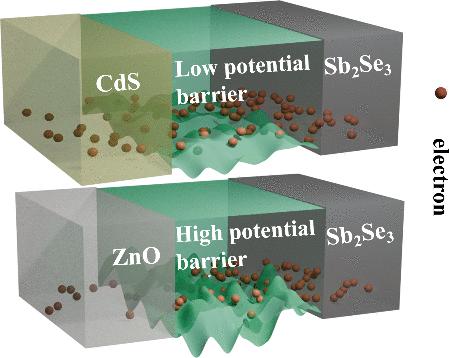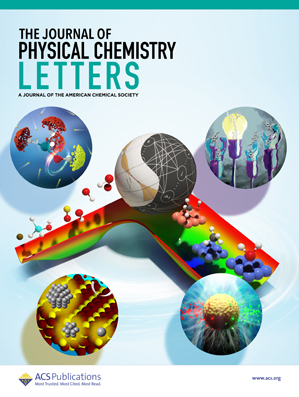Sb2Se3/CdS接口为何能产生更高的功率转换效率
IF 4.8
2区 化学
Q2 CHEMISTRY, PHYSICAL
引用次数: 0
摘要
开发无镉电子传输层(ETL)是硒化锑(Sb2Se3)太阳能电池领域的一个重要课题。目前,无cd的Sb2Se3太阳能电池的功率转换效率(PCE)仍然大大低于基于cd的器件。揭示Sb2Se3/CdS异质结和Sb2Se3/无Cd ETL异质结的电子转移特征对于开发具有高PCE的无Cd Sb2Se3太阳能电池具有重要意义。本文从PCE、阱态钝化、界面电荷分离和皮秒时间尺度载流子动力学的角度系统地研究了Sb2Se3/Cd异质结和Sb2Se3/ZnO异质结。实验结果表明,Sb2Se3/CdS和Sb2Se3/ZnO的电子转移发生在相当的时间尺度上,时间常数分别为1.38 ~ 3.42和1.91 ~ 3.17 ps。有cd器件与无cd器件之间的PCE差距主要由钝化效应决定。CdS对Sb2Se3良好的钝化效果保证了Sb2Se3/CdS异质结处的高电子转移效率。我们的研究结果揭示了提高无镉Sb2Se3太阳能电池性能的关键挑战。本文章由计算机程序翻译,如有差异,请以英文原文为准。

Why Sb2Se3/CdS Interface Produces Higher Power Conversion Efficiency
Developing the Cd-free electron transport layer (ETL) is a crucial subject in the field of antimony selenide (Sb2Se3) solar cells. At present, the power conversion efficiency (PCE) of the Cd-free Sb2Se3 solar cell is still substantially lower than that of CdS-based devices. It is significant to reveal the electron transfer features in Sb2Se3/CdS heterojunction and Sb2Se3/Cd-free ETL heterojunction for development of a Cd-free Sb2Se3 solar cell with high PCE. In this work, Sb2Se3/Cd heterojunction and Sb2Se3/ZnO heterojunction were systematically investigated from the view of PCE, trap state passivation, interface charge separation, and carrier kinetics on a picosecond time scale. Experimental results demonstrate that electron transfer at Sb2Se3/CdS and Sb2Se3/ZnO occurs on a comparable time scale with time constants of 1.38–3.42 and 1.91–3.17 ps, respectively. The PCE gap between the Cd-based device and the Cd-free device is mainly determined by the passivation effect. The excellent passivation effect of CdS on Sb2Se3 ensure the high electron transfer efficiency at Sb2Se3/CdS heterojunction. Our results reveal the key challenges in improving the performance of Cd-free Sb2Se3 solar cells.
求助全文
通过发布文献求助,成功后即可免费获取论文全文。
去求助
来源期刊

The Journal of Physical Chemistry Letters
CHEMISTRY, PHYSICAL-NANOSCIENCE & NANOTECHNOLOGY
CiteScore
9.60
自引率
7.00%
发文量
1519
审稿时长
1.6 months
期刊介绍:
The Journal of Physical Chemistry (JPC) Letters is devoted to reporting new and original experimental and theoretical basic research of interest to physical chemists, biophysical chemists, chemical physicists, physicists, material scientists, and engineers. An important criterion for acceptance is that the paper reports a significant scientific advance and/or physical insight such that rapid publication is essential. Two issues of JPC Letters are published each month.
 求助内容:
求助内容: 应助结果提醒方式:
应助结果提醒方式:


